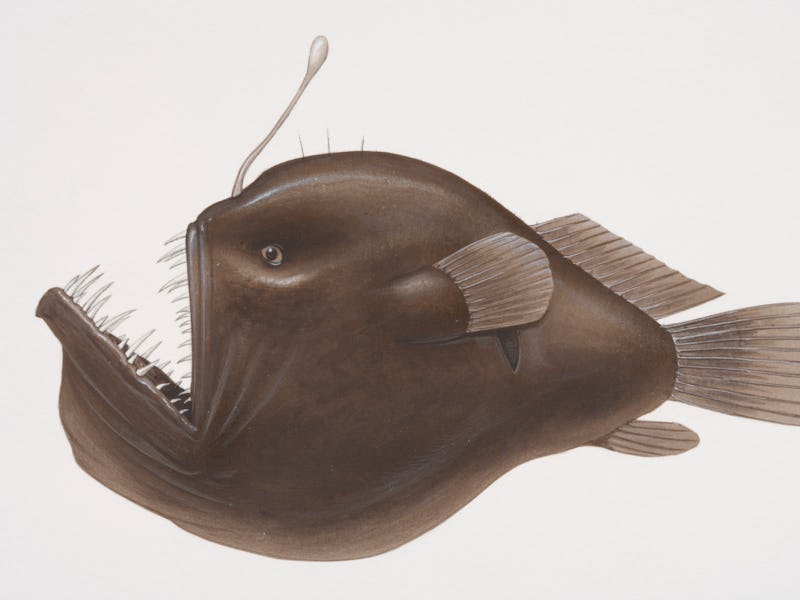Strange anglerfish sex is teaching scientists about the immune system
Medicine's idea of animal models is expanding.

Anglerfish mating is a familiar story: Boy meets girl, boy becomes attached to girl, their bodies and bloodstreams fuse as one, and the pair reproduces happily until the male fish dies.
This one-of-a-kind example of sexual parasitism recently caught the curiosity of medical researchers. For most vertebrates, a merging like this would provoke a harmful, even fatal, immune response. But that doesn't happen in anglerfish.
To solve this scientific puzzle, researchers took a closer look at the genes behind anglerfish immune systems. One day, the study team argues, these findings could inform innovative treatments that support our own human immune system.
In a study released Thursday in the journal Science, researchers outline the unique ways that anglerfish tweak their immune responses in order to survive sexual parasitism, which can be either temporary or permanent. In turn, the team discovered that genetic changes in anglerfish help the fish suppress different functions of the immune system.
Getting the samples for the study took 10 years. Anglerfish can live more than a mile down below, in the weirdest parts of the ocean. They're historically elusive: There are more than 200 species, but females have been studied from only a handful of them. The first visual evidence of deepsea anglerfish mating was released just two years ago.
As a result, while hunting for samples, researchers either came up short or would find unusable anglerfish, study co-author Thomas Boehm tells Inverse.
"When they pull them up from the abyss, they're all dead," Boehm, a professor at the Max Planck Institute of Immunobiology and Epigenetics, explains.
Eventually, the team collected 31 samples and conducted a genetic analysis of 10 species of anglerfish.
Altered immune systems — The specific ways that anglerfish equip themselves to survive depends on the type of attachment they do. Of the 10 anglerfish species studied here, four utilized temporary attachment and six were permanent — meaning that, to mate, males bit into their body of females, causing their tissues and circulatory systems to fuse.
In the case of permanent attachment, females must avoid immune rejection of the male anglerfish. Normally, rejection happens when killer cells target the foreign introduction and, indeed, kill it.
"It's basically preventing, if you wish, allergic reactions."
But in the case of anglerfish "that doesn't seem to happen," Boehm says. Female angler fish evolved and got rid of the genes that cause that response.
In species that attach only temporarily, male and female bodies don't completely fuse together. To prevent problems with that arrangement, temporarily attaching species alter their antibody response. Typically, being exposed to an antigen repeatedly (in this case, different mates) would cause the immune response to ramp up each time. A dramatic antibody response would put anglerfish at risk of detaching during mating before the deed is done. So the build-up doesn't occur.
"It's like seeing the antigen every time for the first time," Boehm says. "It's basically preventing, if you wish, allergic reactions."
There are more than 200 species of anglerfish. This female has multiple males attached.
In either case, weakening immune response would naturally leave an organism more vulnerable. Anglerfish seem to have figured out a way around that in order to survive.
"They must have found a compensation," Boehm says. Something innate is helping them survive despite the weakened immune response.
That's what Boehm is especially interested in — the possibility that anglerfish findings could help scientists create better medicine for humans.
Anglerfish inform medicine — The new anglerfish findings raise some points about flexibility and plasticity in animals' immune systems.
Over time, animal immune systems can become more flexible, challenging a common theory that immune responses tend to remain the same. The idea of animals of the same genotype expressing different traits depending on their environment is known as phenotypic plasticity.
There's a ton of diversity when it comes to animals that have some phenotypic plasticity, Boehm says: Look no further naked mole rats, which are believed to be immune to cancer. In research on Covid-19, some scientists are studying pangolins, which have a weakened immune response that protects them from the worst outcomes of the virus.
These peculiar animal models have a lot to offer medical science, Boehm says. They can help researchers come up with targeted drugs that limit harmful immune responses in humans
"We are not doing us a service if we ignore them and simply focus on the standard models," Boehm says.
Boehm suggests that humans can learn from the long-standing history of animal adaptations. After all, we Homo sapiens are still relatively new on the scene, and so is research into how we can learn from nature's tricks to survive.
"Nature has had 500 million years of evolutionary time to explore the space of possibilities," Boehm says, "and we've only just started."
Abstract: Sexual parasitism has evolved as a unique mode of reproduction among deep-sea anglerfishes. The permanent attachment of males to host females observed in these species represents a form of anatomical joining, which is otherwise unknown in nature. Striking modifications to immune facilities are associated with this reproductive trait. The genomes of species with temporarily attaching males lack functional aicda genes that underpin affinity maturation of antibodies. Permanent attachment is associated with additional alterations, culminating in the loss of functional rag genes in some species, abolishing somatic diversification of antigen receptor genes, the hallmark of canonical adaptive immunity. In anglerfishes, coevolution of innate and adaptive immunity has been disentangled, implying that an alternative form of immunity supported the emergence of this evolutionarily successful group of vertebrates.
This article was originally published on